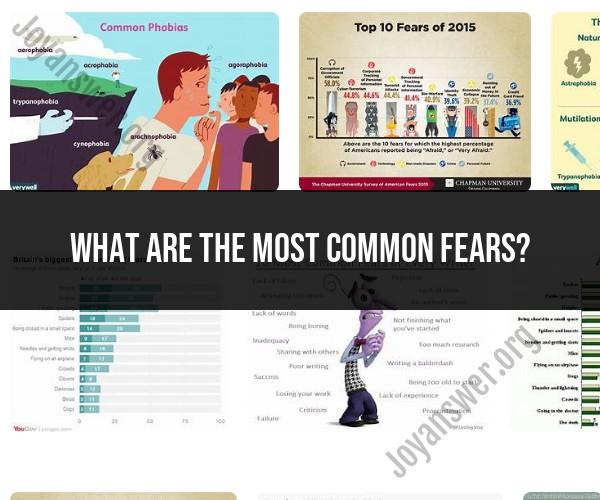What are the most common fears?
Common fears, or phobias, can vary from person to person, but there are several fears that are widely recognized and experienced by many people. These common fears include:
- Arachnophobia: Fear of spiders.
- Ophidiophobia: Fear of snakes.
- Acrophobia: Fear of heights.
- Claustrophobia: Fear of confined spaces.
- Agoraphobia: Fear of open or crowded spaces.
- Cynophobia: Fear of dogs.
- Trypophobia: Fear of clusters of small holes or irregular patterns.
- Social Anxiety: Fear of social situations or social interactions.
- Glossophobia: Fear of public speaking.
- Aerophobia: Fear of flying.
- Dentophobia: Fear of the dentist or dental procedures.
- Hemophobia: Fear of blood.
- Nyctophobia: Fear of darkness or nighttime.
- Entomophobia: Fear of insects.
- Thanatophobia: Fear of death or dying.
- Claustrophobia: Fear of small spaces.
- Astraphobia: Fear of thunder and lightning.
- Aphenphosmphobia: Fear of intimacy or physical contact.
- Germs and Contamination: Fear of germs, dirt, or contamination.
- Needles and Injections: Fear of needles, injections, or medical procedures.
It's important to note that while these fears are common, the severity of phobias can vary widely. For some individuals, these fears may be minor and manageable, while for others, they can be debilitating and require treatment or therapy.
Additionally, individuals can have unique fears that may not fit into these categories. Phobias can develop as a result of past traumatic experiences, learned behaviors, or genetic predispositions. Overcoming phobias often involves a combination of therapy, exposure techniques, and support.
If you or someone you know is struggling with a fear or phobia that significantly impacts daily life, it is advisable to seek the guidance of a mental health professional who can provide appropriate treatment and support.
Common Fears and Human Psychology: Exploring Widespread Anxieties
Fear is a natural human emotion that is triggered by a perceived threat. It can be a powerful motivator, helping us to avoid danger and survive. However, fear can also be debilitating, interfering with our daily lives and preventing us from reaching our full potential.
Some of the most common fears include:
- Fear of heights (acrophobia)
- Fear of closed spaces (claustrophobia)
- Fear of spiders (arachnophobia)
- Fear of snakes (ophidiophobia)
- Fear of public speaking (glossophobia)
- Fear of social situations (social anxiety disorder)
- Fear of failure (atychiphobia)
- Fear of flying (aviophobia)
- Fear of death (thanatophobia)
These fears can be caused by a variety of factors, including genetics, life experiences, and learned associations. For example, someone who has had a traumatic experience involving heights may be more likely to develop a fear of heights.
The Fear Factor: A Deep Dive into Common Human Apprehensions
Fear is a complex emotion that can manifest in a variety of ways. Some people may experience physical symptoms of fear, such as a racing heart, sweating, or trembling. Others may experience emotional symptoms of fear, such as anxiety, panic, or dread. Fear can also lead to behavioral changes, such as avoidance or escape.
The way that fear is experienced and expressed can vary depending on the individual. For example, someone with a fear of public speaking may avoid giving presentations altogether. Someone with a fear of spiders may have a panic attack if they see a spider.
Coping with Fear: Strategies for Managing and Overcoming Common Fears
There are a number of strategies that can be used to cope with and overcome common fears. Some of the most effective strategies include:
- Exposure therapy: Exposure therapy involves gradually exposing yourself to your fear in a safe and controlled environment. This can help you to learn to manage your fear and anxiety.
- Cognitive-behavioral therapy (CBT): CBT is a type of therapy that focuses on changing your thoughts and behaviors related to your fear. For example, a CBT therapist might help you to identify and challenge negative thoughts about your fear.
- Relaxation techniques: Relaxation techniques, such as deep breathing and meditation, can help to reduce anxiety and manage stress.
- Medication: In some cases, medication may be used to treat fear and anxiety disorders. However, medication should only be used under the supervision of a doctor.
If you are struggling to cope with a common fear, it is important to seek professional help. A therapist can help you to develop a personalized treatment plan that is right for you.
Here are some additional tips for coping with fear:
- Talk to someone you trust. Talking about your fear can help you to feel better and to get support.
- Learn more about your fear. The more you know about your fear, the better equipped you will be to manage it.
- Set realistic goals. Don't try to overcome your fear all at once. Start by setting small, achievable goals for yourself.
- Be patient. Overcoming a fear takes time and effort. Don't get discouraged if you don't see results immediately.
Remember, fear is a normal human emotion. It is important to learn how to manage your fear so that it does not control your life.













